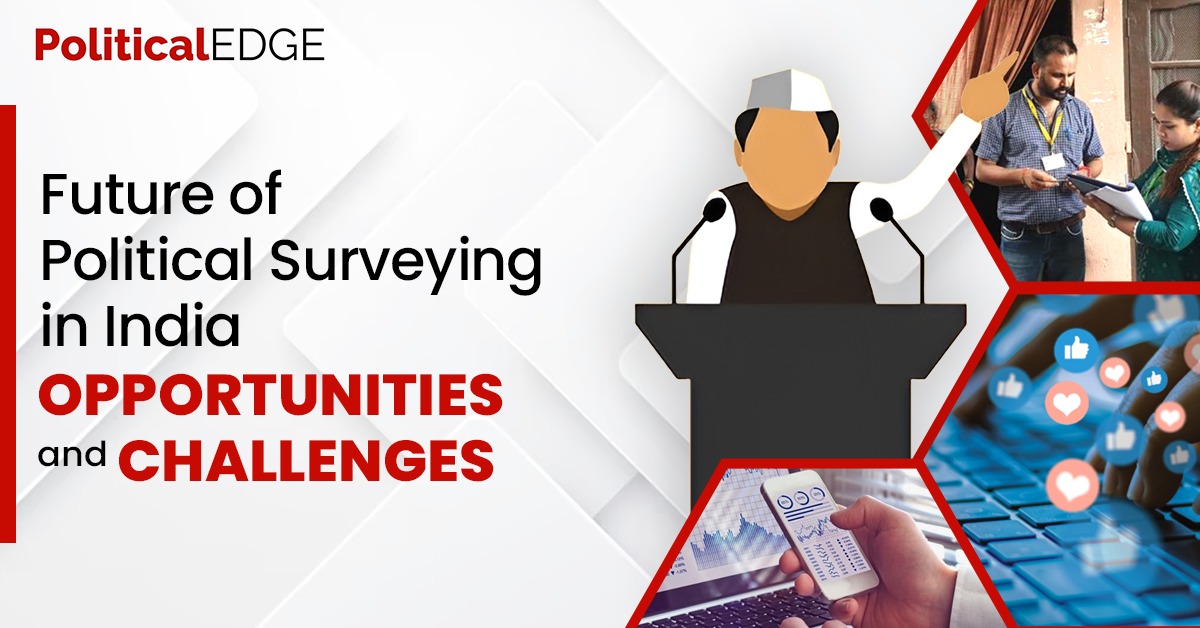
Future of Political Surveying in India: Opportunities and Challenges
Political surveys have long served political parties worldwide by shaping the democratic process. With the help of data and analytical tools, they predict the election results and advise the political parties to segue their campaigns toward winning. India is a country with diverse political aspects. The Future of Political Surveys in India is based on the dynamism of the economy, population, ethical considerations, etc. However, with the advent of political surveying agencies, surveys in politics holds a lot of scope and benefits for political parties.
In this blog, we aim to explore the opportunities and challenges that will determine the future of political surveying in India.
What is Political Surveying?
A political survey is the method to gauged the population’s attitude, behaviors, trend, interest, pain points, favoritisms, etc. This data is collected through a sample population with diverse interests and backgrounds that represents a larger population. This huge data is later used by political parties to design campaigns to gain maximum support.
Political parties not only design their campaign but also interpret the data to predict the results of future elections. However, this political survey play multiple roles in serving the right information to the political parties. As the prospect of political surveys become important, it becomes necessary to explore it’s future aspects in terms of challenges and opportunities that it brings to India.
What are the Challenges Associated with Political Surveying?
Privacy Concerns
The new phase of political surveying heavily relies of digital platforms for survey and data interpretation. As this grows the issue with data privacy persists. The respondents data is subjected to misuse and can negatively impact the political results. It is necessary to introduce ethical concerns and data privacy measures on this account.
Political Bias and Manipulation
Whenever raw data is involved, data manipulation co-exists. This large number of data available on digital platforms is really is to manipulate and mend it to one’s interest. Surveys done by political parties can be interpreted to present favorable outcome.
Digital Literacy
These days most of the surveys are conducted online. In this case, not every part of the population can participate. The biggest challenge is that only the ones with the literacy know-how can have access to digital polls and survey. Therefore, the political surveying leaves behind a majority of these people.
Respondent Fatigue
Frequent surveys can cause respondent fatigue. This is the situation, when respondents are less willing to participate. This can reduce the reliability of the data and make it less accurate.
What are the New Opportunities in political Surveying?
Technological Advancement
Gone are the days of door-to-door surveys, that involves a gigantic workforce to conduct the surveys. With a few codes and set-up polls and surveys can be conducted online. These digital surveys can reach a larger audience. Mobile apps and online platforms can facilitate real-time data collection, making it easier to gauge public opinion across different regions and demographics.
Increased Voter Engagement
Digital platforms cover a large number of voters and provides them new avenues to explore. This can be done through interactive polls, opinion polls, and by filling up feedback forms. The idea is to interact and gain the insights of voters as much as we can. This engagement not only helps in data collection but also fosters a sense of involvement among the electorate.
Regional Insights
India is a diverse nation and to truly recognize the political potential, a political survey needs regional, and local insights. All the issues needs to be addressed and worked upon. This can be done by conducting polls in different languages, so that we can even target sensitive questions to get a deeper insights on the problems. This will help political parties to prioritize addressing the issues more effectively and efficiently.
Transparency & Accountability
The future of political surveying will be recognized only when transparency and accountability is maintained by political parties. With the help of latest technology, integrity and transparency in data collection can be maintained. This will ensure that the data thus collected is authentic and is not manipulated. This will also ensure that there is certain accountability for the data.
Big Data Analytics
This new age of political surveying allows one to collect ample data, and in turn also offers the opportunity to easily analyze the data. By analyze large data collected from various sources like social media, news channels, polling’s, etc., interpreters can gauged the true intentions of the voters. Machine learning algorithms can further help them to identify the true data potential.
Conclusion
While the opportunities for more accurate, inclusive, and engaging surveys are immense, they come with significant challenges that must be addressed. By addressing both opportunities and challenges, political surveying agencies can easily navigate these surveys and get to the depth of true results.

